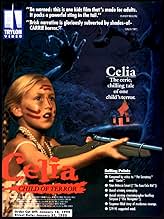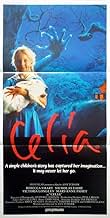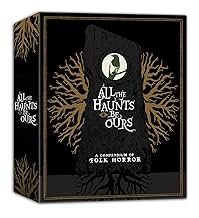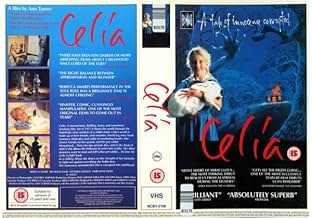PUNTUACIÓN EN IMDb
6,8/10
1,7 mil
TU PUNTUACIÓN
Una joven imaginativa y algo perturbada fantasea con criaturas malvadas y otras rarezas para enmascarar sus inseguridades mientras crece en la Australia rural.Una joven imaginativa y algo perturbada fantasea con criaturas malvadas y otras rarezas para enmascarar sus inseguridades mientras crece en la Australia rural.Una joven imaginativa y algo perturbada fantasea con criaturas malvadas y otras rarezas para enmascarar sus inseguridades mientras crece en la Australia rural.
- Premios
- 2 premios y 2 nominaciones en total
Reseñas destacadas
In summer, 2003, I took a class about Australian cinema. We watched films like "Walkabout", "Gallipoli" and "Rabbit-Proof Fence"; it might have thrown a wrench in the works had we watched "Celia". At the video/DVD store, I found it under the horror section, but it's only a horror flick in the loosest terms. The movie deals with a nine-year-old girl (Rebecca Smart) in 1950s Australia whose amorality and alienation from society drive her to complete madness; I think that that was the plot. Certainly it's ugly what Celia does, but seeing what the adults around her are like, I felt that I had no choice except to root for Celia.
The historical context involves the Cold War and the government's efforts to stop the rabbit infestation. As people tell Celia not to fraternize with children of communists, she grows more and more disenchanted with the world around her - after all, friends are supposed to be friends no matter what the parents' political activity. But when a cop takes away her pet rabbit, she really gets nasty (it also shows that the rabbit-proof fence that lent its name to the 2002 movie clearly didn't work in holding back the leporid plague).
So how to interpret this movie? It looks at face value like one of the many instances of a seemingly cute girl having a not so cute side (think "The Bad Seed"). One might say that the rabbits play a role similar to the ones in "Night of the Lepus" and "Donnie Darko", even though Celia's rabbit doesn't do anything. I guess that it's worth seeing, if only once.
The historical context involves the Cold War and the government's efforts to stop the rabbit infestation. As people tell Celia not to fraternize with children of communists, she grows more and more disenchanted with the world around her - after all, friends are supposed to be friends no matter what the parents' political activity. But when a cop takes away her pet rabbit, she really gets nasty (it also shows that the rabbit-proof fence that lent its name to the 2002 movie clearly didn't work in holding back the leporid plague).
So how to interpret this movie? It looks at face value like one of the many instances of a seemingly cute girl having a not so cute side (think "The Bad Seed"). One might say that the rabbits play a role similar to the ones in "Night of the Lepus" and "Donnie Darko", even though Celia's rabbit doesn't do anything. I guess that it's worth seeing, if only once.
"Celia" follows the title character, a young girl growing up on the outskirts of 1950s Melbourne during the "Red Scare." After her beloved grandmother's death, Celia, prone to fantasies and possessing an extreme imagination, begins to imagine the tumultuous world around her as plagued by fairytale monsters, inadvertently leading her toward tragic events.
This little-seen fantasy horror film from Australia was largely missed by audiences when first released, though it is due for some reevaluation. Writer-director Ann Turner offers here a vivid portrait of childhood loneliness that illustrates the ways in which serious matters of the "adult" world (here, Turner focuses largely on political turmoil) impact the psyche of impressionable youth.
The lead character is brilliantly portrayed by the young Rebecca Smart, and the film is underpinned by strong performances from the entire cast. In some ways, it recalls the dreamy nightmare world of something like "Lemora" or "Valerie and Her Week of Wonders," and in others, functions as a precursor to Peter Jackson's "Heavenly Creatures"--though in this case, it is an even younger child whose loose grip on reality hurls her toward oblivion. Despite the serious implications and consequences at hand, the film still manages to retain some lightness to it that makes it highly watchable, and, though often been classified as a horror film, it really plays more like a dark fantasy with tinges of the macabre.
The one downfall is that the film's conclusion does feel slightly irresolute given the established gravity of the situation, but "Celia" remains a stolid, effective portrait of a child whose alienation from the world around her is drawn in a way that adults can empathize with. After all, we were all children once, right? 9/10.
This little-seen fantasy horror film from Australia was largely missed by audiences when first released, though it is due for some reevaluation. Writer-director Ann Turner offers here a vivid portrait of childhood loneliness that illustrates the ways in which serious matters of the "adult" world (here, Turner focuses largely on political turmoil) impact the psyche of impressionable youth.
The lead character is brilliantly portrayed by the young Rebecca Smart, and the film is underpinned by strong performances from the entire cast. In some ways, it recalls the dreamy nightmare world of something like "Lemora" or "Valerie and Her Week of Wonders," and in others, functions as a precursor to Peter Jackson's "Heavenly Creatures"--though in this case, it is an even younger child whose loose grip on reality hurls her toward oblivion. Despite the serious implications and consequences at hand, the film still manages to retain some lightness to it that makes it highly watchable, and, though often been classified as a horror film, it really plays more like a dark fantasy with tinges of the macabre.
The one downfall is that the film's conclusion does feel slightly irresolute given the established gravity of the situation, but "Celia" remains a stolid, effective portrait of a child whose alienation from the world around her is drawn in a way that adults can empathize with. After all, we were all children once, right? 9/10.
It is with a heavy heart that I note Celia, possibly my favourite film, is now being marketed with a tacky subtitle. This film is comparable to Jane Campion's work and is anything but a straight horror film, with a subtle characterisation and a compassionate yet unsentimental picture of childhood not generally associated with that genre. The narrative viewpoint is well sustained, with the grownup world of barbecues, blacklists, and affairs observed from a child's angle. The horror in question is in Celia's imagination, which, like that of all children, plays out the stresses of her own family and her culture. Various plagues - literal and metaphoric - impinge on her world, from myxomatosis to communism. Fans of blood and gore will be disappointed. The film is an unhurried portrait of 50s Australia, the pressure to conform, childhood, death. Its climax is sharp and bloody but logical; as is the lightness of the ending. As a touchstone, think of the daughter in the Piano, with her outrageous storybook lies, her spontaneity, her hurt rebellion, and her ultimate childishness. Just don't think Carrie. This is gem of a film, and let's face it, Hollywood churns out a lot of disappointing ones. As soon as you see the opening titles with Rebecca Smart's expressive face glancing all around her, while the theme music plays, you'll realise you're in the hands of a very talented director.
This strange little movie from the land Down Under is really two movies, one of which definitely works, but the other not so much. On one hand, it is a fairly realistic portrait of rural Australia in the 1950's that was dealing with both a plague of rabbits and of Communists. In retrospect, the wild rabbits had a far better chance of over-running conservative Australia than the commies, but the wars on both these "plagues" were somewhat similar in that, as well-intentioned as they may have been, a lot of innocents were caught in the crossfire. "Celia", the young heroine of this film, for instance, has recently lost her Communist grandmother and loses her only friends due to their parents ties to the Australian CP. The fateful blow,however, comes when she loses her beloved pet rabbit "Murgatroyd" to the authorities.
"Celia" is portrayed as having a rich fantasy life that leaves her disturbed and even dangerously disconnected from reality (not unlike the two young girls in the later Peter Jackson kiwi film "Heavenly Creatures"). However, the movie does not focus on this dark fantasy aspect nearly enough, and "Celia" is portrayed as a rather ordinary and, moreover, very sympathetic young girl, which makes the one scene of real-life violence that occurs (actually, it is left a little ambiguous) not very believable. It also doesn't help, as others have said, that in America they seized on the under-developed and unbelievable aspects by trying to market this as a horror movie. This is not quite as good as Peter Weir's famous Aussie film "Picnic at Hanging Rock", but like that movie it has been mis-categorized as a horror movie, and no doubt will disappoint fans of gory, visceral horror, while scaring away a lot of the foreign/art-film enthusiasts that might enjoy it. I actually like both horror and art films, but this is definitely mostly the latter. It would make a good double bill with "Picnic" or "Heavenly Creatures"--or, even better, the weird 1970's indie American film "The Orphan".
It is definitely very well made and the acting is excellent, especially the young Rebecca Smart (child actors in Commonwealth always seem to be far, far better actors than the cloying, "adorable" moppets Hollywood always insists on casting in their saccharine kiddie crap). Check it out if you get a chance.
"Celia" is portrayed as having a rich fantasy life that leaves her disturbed and even dangerously disconnected from reality (not unlike the two young girls in the later Peter Jackson kiwi film "Heavenly Creatures"). However, the movie does not focus on this dark fantasy aspect nearly enough, and "Celia" is portrayed as a rather ordinary and, moreover, very sympathetic young girl, which makes the one scene of real-life violence that occurs (actually, it is left a little ambiguous) not very believable. It also doesn't help, as others have said, that in America they seized on the under-developed and unbelievable aspects by trying to market this as a horror movie. This is not quite as good as Peter Weir's famous Aussie film "Picnic at Hanging Rock", but like that movie it has been mis-categorized as a horror movie, and no doubt will disappoint fans of gory, visceral horror, while scaring away a lot of the foreign/art-film enthusiasts that might enjoy it. I actually like both horror and art films, but this is definitely mostly the latter. It would make a good double bill with "Picnic" or "Heavenly Creatures"--or, even better, the weird 1970's indie American film "The Orphan".
It is definitely very well made and the acting is excellent, especially the young Rebecca Smart (child actors in Commonwealth always seem to be far, far better actors than the cloying, "adorable" moppets Hollywood always insists on casting in their saccharine kiddie crap). Check it out if you get a chance.
CELIA is an interesting film. Set in the 1950s, during the big, Australian rabbit plague, it's about the little girl of the title (Rebecca Smart), who has difficulty with a group of kids in her school. When a new family moves in nearby, Celia befriends the children. Trouble brews when she discovers that her pet rabbit has been taken away due to a recent edict.
With this movie, it's all about the finale, which is quite an unexpected shocker. It packs a punch, and turns what was mostly a drama with political aspects, into a horror story. Ms. Smart is exceptional in her highly-imaginative / disturbed role.
A one-of-a-kind gem...
With this movie, it's all about the finale, which is quite an unexpected shocker. It packs a punch, and turns what was mostly a drama with political aspects, into a horror story. Ms. Smart is exceptional in her highly-imaginative / disturbed role.
A one-of-a-kind gem...
¿Sabías que...?
- CuriosidadesThe fairy tale from which extracts were recited in the film was The Hobyahs by James H. Fassett and Robert D. San Souci.
- PifiasThe burn mark on Celia's rabbit is missing at the fishing docks.
- ConexionesFeatured in Film Review and Interview with Ann Turner from the 'Sunday' Show (1989)
Selecciones populares
Inicia sesión para calificar y añadir a tu lista para recibir recomendaciones personalizadas
- How long is Celia?Con tecnología de Alexa
Detalles
- Fecha de lanzamiento
- País de origen
- Sitios oficiales
- Idioma
- Títulos en diferentes países
- Celia: Child of Terror
- Localizaciones del rodaje
- Empresa productora
- Ver más compañías en los créditos en IMDbPro
- Duración1 hora 42 minutos
- Mezcla de sonido
- Relación de aspecto
- 1.85 : 1
Contribuir a esta página
Sugerir un cambio o añadir el contenido que falta

Principal laguna de datos
By what name was Celia (1989) officially released in India in English?
Responde























